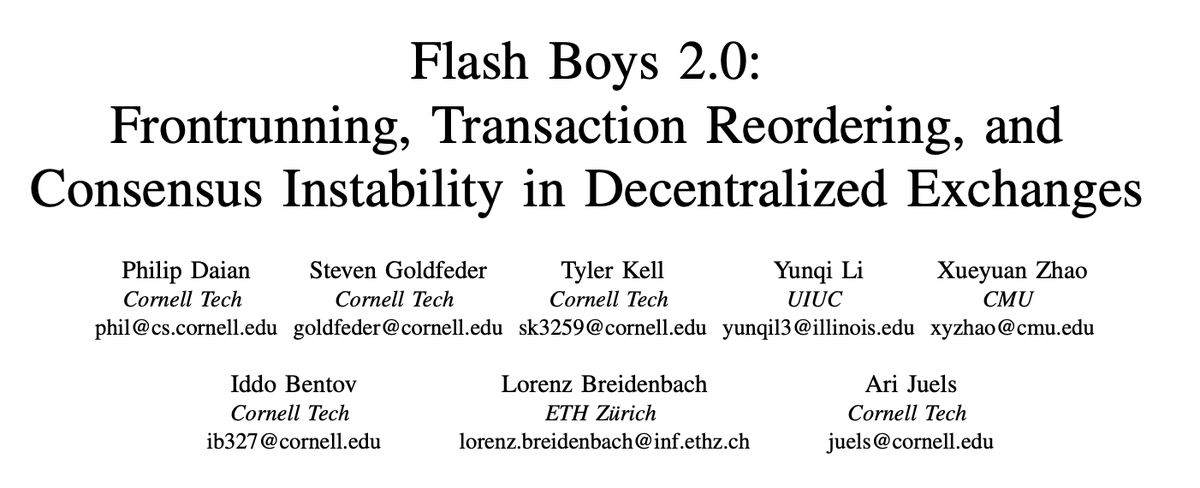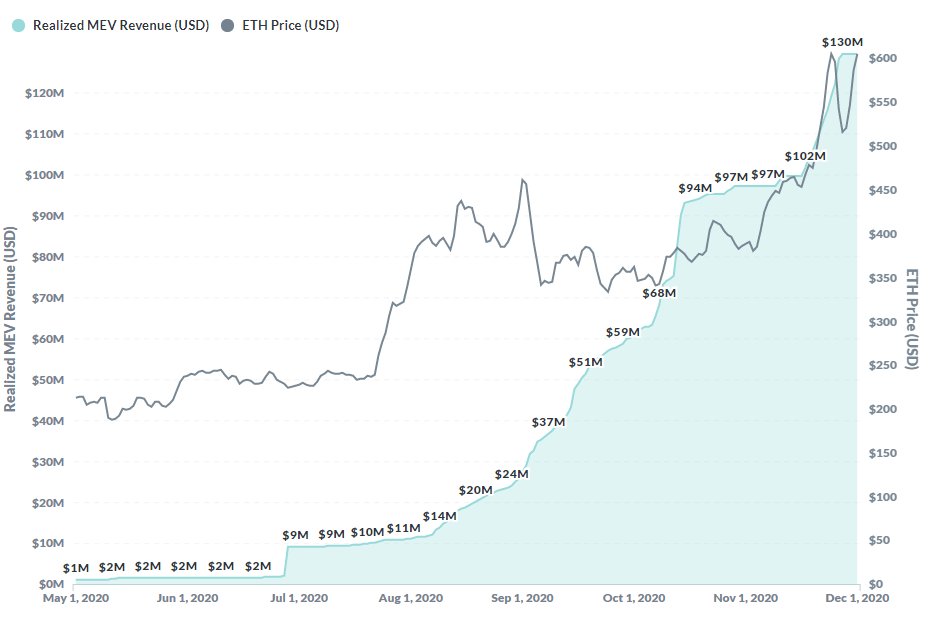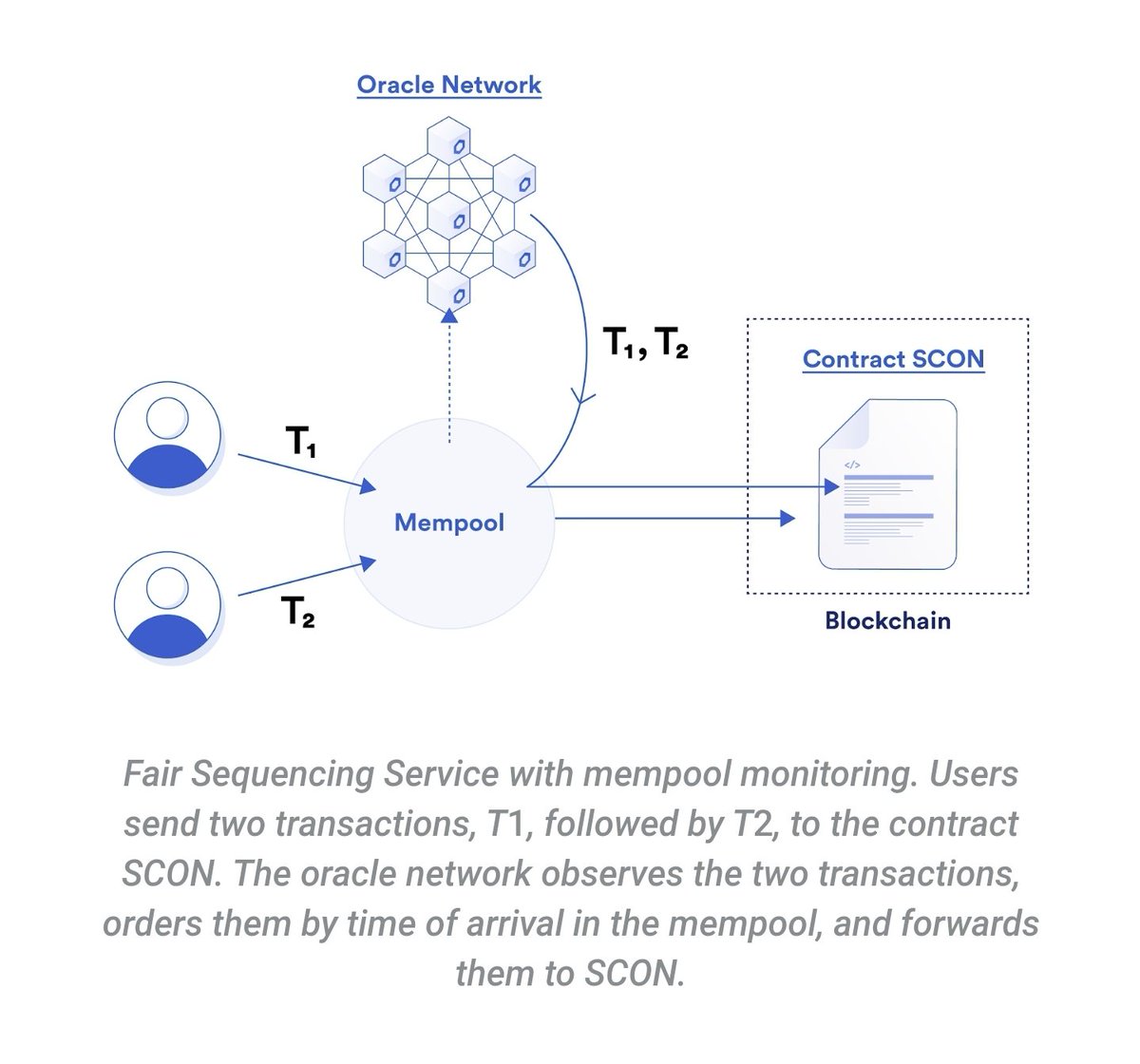1/ With connectivity solved by @Chainlink and scalability in progress of being solved by L2 Rollups like @Arbitrum, I truly believe the next large hurdle for the adoption of smart contracts is solving Miner Extractable Value (MEV)
A thread https://research.paradigm.xyz/MEV
https://research.paradigm.xyz/MEV
A thread
 https://research.paradigm.xyz/MEV
https://research.paradigm.xyz/MEV
2/ MEV is the value miners can extract from users through their ability to manipulate the ordering and inclusion of transactions within a block
MEV is mostly taken by third party bots today but miners will inevitably begin taking all the MEV opportunities
https://arxiv.org/abs/1904.05234
MEV is mostly taken by third party bots today but miners will inevitably begin taking all the MEV opportunities
https://arxiv.org/abs/1904.05234
3/ MEV presents itself in various forms including arbitrage opportunities between DEXs after a large trade, as well as directly frontrunning DEX trades causing unnecessary slippage
This degrades the user experience and creates an invisible tax on users
This degrades the user experience and creates an invisible tax on users
4/ Bots compete to capture this MEV through gas price bidding wars because miners *usually* order transactions with the highest gas price first to optimise their revenue
Once miners start to take this MEV, they may begin to re-org the blockchain causing consensus instability
Once miners start to take this MEV, they may begin to re-org the blockchain causing consensus instability
5/ A promising solution to MEV is using external oracles to determine the ordering of transactions based on an predetermined policy
This is exactly what #Chainlink Fair Sequencing Services (FSS) aims to provide for the smart contract ecosystem http://blog.chain.link/chainlink-fair-sequencing-services-enabling-a-provably-fair-defi-ecosystem
This is exactly what #Chainlink Fair Sequencing Services (FSS) aims to provide for the smart contract ecosystem http://blog.chain.link/chainlink-fair-sequencing-services-enabling-a-provably-fair-defi-ecosystem
6/ Chainlink FSS uses a decentralized oracle network to order transactions and operates without any changes to the L1 blockchain on which a smart contract operates
Unlike MEV auctions which centralizes unfair transaction ordering, FSS prevents it https://medium.com/offchainlabs/mev-auctions-considered-harmful-fa72f61a40ea
Unlike MEV auctions which centralizes unfair transaction ordering, FSS prevents it https://medium.com/offchainlabs/mev-auctions-considered-harmful-fa72f61a40ea
7/ Chainlink FSS can use any ordering policy including 'time of arrival' as well as more complex strategies such as ordering encrypted transactions which are only decrypted after
FSS is essentially a framework for implementing any ordering policy a developer wants for their SC
FSS is essentially a framework for implementing any ordering policy a developer wants for their SC
8/ FSS supports various ways in which users can submit their transactions to be ordered
The first provides legacy compatability where users make their transactions like usual to the blockchain and the oracles monitor the mempool where transactions wait to get mined on-chain
The first provides legacy compatability where users make their transactions like usual to the blockchain and the oracles monitor the mempool where transactions wait to get mined on-chain
9/ As long the transaction hits the mempool it doesn't matter how quickly the transaction is mined, as long as it *eventually* does
This allows users to submit transactions with much lower gas prices as the oracles will resubmit the transaction in an ordered batch right away
This allows users to submit transactions with much lower gas prices as the oracles will resubmit the transaction in an ordered batch right away
10/ Secondly, users can send their transactions directly to the oracle network, skipping the mempool all together
As the oracles batch ordered transactions together into a single transaction, the per-user costs are greatly reduced and can even be implemented as a Rollup
As the oracles batch ordered transactions together into a single transaction, the per-user costs are greatly reduced and can even be implemented as a Rollup
11/ Chainlink FSS supports ordering transactions for smart contracts on any L1 blockchain or L2 network
On L1, ordering is done on a contract by contract basis, but an L2 network (e.g. Arbitrum) can use FSS to order *all* transactions, enforcing fair ordering by default
On L1, ordering is done on a contract by contract basis, but an L2 network (e.g. Arbitrum) can use FSS to order *all* transactions, enforcing fair ordering by default
12/ Using Chainlink FSS to order transactions, smart contracts can prevent the frontrunning of DEX trades as well as reduce network gas costs by preventing the gas price bidding wars caused by arbitrage opportunitie
Less slippage, lower fees, and more fair applications
Less slippage, lower fees, and more fair applications
13/ Hopefully by this point it's become clear that #Chainlink oracles provide value far beyond reference price feeds
Chainlink is really a framework for creating decentralized, generalized, and trust-minimized off-chain services to boost the capabilities of any smart contracts
Chainlink is really a framework for creating decentralized, generalized, and trust-minimized off-chain services to boost the capabilities of any smart contracts

 Read on Twitter
Read on Twitter




